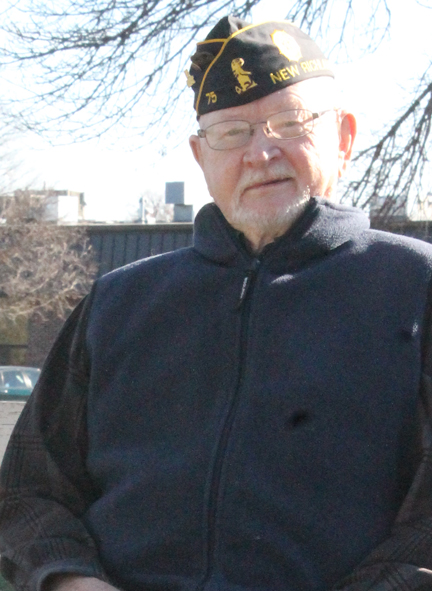Bartness recalls post-combat World War II days

Don Bartness
By RACHEL RIETSEMA
Staff Writer
The year was 1945, and things overseas were still as they say, dicey.
But, luckily for New Richland native Don Bartness, World War II combat had just ended.
“On our ship ride to Japan, I was really sea sick,” Bartness said. “I was ordered to keep watch for mines, but I didn’t care if the mine hit us or not. That’s how sick I was.”
Toward the latter part of this 18-day journey, he and his stomach were on better terms. However, when he set foot on land, his luck continued as the ground began swaying from side to side.
“I don’t remember where we landed because I was pretty sick,” he said. “Everything was way flat to the ground if you know what I mean.”
The following day, he safeguarded a warehouse. The Japanese were hungrier than heck, you see.
“We kept a lot of food in there,” he said. “Now a part of the 77th division, we soon went to Hon Shu Island, which is close to Russia.”
Settled up in the mountains now, all that lay below required searching. The village search often turned up knives, guns, you name it.
“It was sure cold in those mountains,” he said. “We were up there for five or six days.”
Upon completion of that mission, Bartness and his troops sieged nice, big hotels to sleep in. Then, during the daytime hours, they began carpentry work for their barracks.
“We took care of making cabinets,” he said. “I had to make trays for all the drawers. We also dug holes for the sewer and laid 1 by 6 boards over the tops of them all around the whole building.”
Next on the agenda involved searching caves, once again up in the mountains. You never knew where the Japanese might be, according to Bartness.
“What they had in the caves, they gave up to us right away,” he said. “They hid guns, bullets and grenades. We even encountered five or six people in there too.”
For protection, he carried a flamethrower at his side. And, boy it sure made him feel a lot safer.
“It shot fire way out,” he said. “I was in the 77th division for I would say about six months and then I joined the paratroopers for the remaining year and a half.”
Now earning $50 more a month, he endured many rigorous hours of training. You see, there’s no funny business when it comes to jumping out of planes, after all.
“Say for instance you went crazy or dopy, they trained us to jump out even in that condition,” he said. “They train you that hard.”
But, before becoming an official paratrooper, five jumps had to be successfully completed.
“I was so scared during my first jump, but I made it,” he said. “I did that all in less than a month to qualify.”
Not soon after, he recalls heading back to camp, only to be ordered back to conduct a cave search. He couldn’t go though, as the doctor didn’t O.K. it.
“If I had gone up there, I would have gotten Buck Sergeant,” he said. “I would have gone sicker than a dog if I had known that.”
What’s even worse is that same day he borrowed his shiny boots to a fellow soldier.
“The toes were all scratched up when he came back from the cave mission,” he said. “I also remember another duty I had for four to five months that involved driving the big fire truck.”
He often recalls the truck traveling at 40 miles per hour, a speed only possible with the throttle wide open. Clearly, not a very fast speed to put out a blazing fire.
“One day after driving I was so thirsty,” he said. “Our cans were all marked so I grabbed what I thought was water, but it turns out that I drank this can of gasoline right up.”
As a result, he endured a few good rounds of puking.
“I asked, ‘How comes there is gas in the water can,” he said. “They said, ‘We didn’t have anything to put it in so we put it in that.’”
Usually however, fulfilling basic living necessities generally came without a problem. Showers especially were a thing of grandeur.
“In Synadi, Japan, water flowed from the mountains and ran into a building,” he said. “There were pools all around it. We could choose hotter or cooler water to take a bath.”
The Japanese children however weren’t so lucky.
“The children leaned up against our garbage cans,” he said. “I always liked to save some food for the kids because they didn’t start the war. I do remember how some soldiers put their cigarette ashes in the food, but the kids ate it anyway. It was terrible.”
And, as far as the toilet situation went, let’s just say that the word unisex came into play. So did the work outdoor.
“They built them outside, a whole row of them,” he said. “Also, if a horse went to the bathroom on the ground, the Japanese had to scoop it right then to fertilize their fields.”
Many more numerous sitiations were thrown his way, but in the midst of it all, one very important truth remained.
“I was just me in the Army,” he said. “I thought nothing of it. Even today, I wear my cap and people thank me.”
He concluded, “I never shot anyone there because the combat was over. But those 77th division guys, you could hardly talk to some of them. Boy it hurt them. They were just heartbroken some of them. I saw plenty too though.”